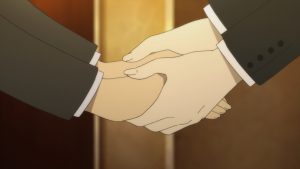 You guys seem to have checked out on Piano no Mori a while ago – to the extent that you were ever tuned in. It’s understandable with the erratic release schedule and all, but while that’s thrown me at times too, I’ve been pretty content to stay the course. There are certainly flaws here – both in the adaptation and the source material – but this series is so thematically unusual for anime in 2018 that I can overlook all that with relative ease. This interests me, period, and on the whole I think the show was pretty well done.
You guys seem to have checked out on Piano no Mori a while ago – to the extent that you were ever tuned in. It’s understandable with the erratic release schedule and all, but while that’s thrown me at times too, I’ve been pretty content to stay the course. There are certainly flaws here – both in the adaptation and the source material – but this series is so thematically unusual for anime in 2018 that I can overlook all that with relative ease. This interests me, period, and on the whole I think the show was pretty well done.
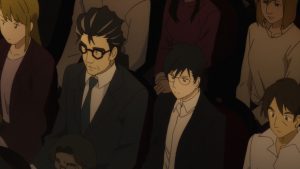 As to flaws in the adaptation, I think they’re pretty obvious. The CG animation during the performance scenes is generally unimpressive, obviously a cost-saving measure. That’s by no means a deal-breaker but in a series about playing the piano, it’s certainly not trivial. There’s also a general lack of signature style to Piano no Mori, period. There’s certainly nothing definably “Gainax” to it, but I expected that to be the case. The larger point is that there’s nothing recognizably unique to the style, period – it’s very direct and linear. Competent but generic in interpretation – ironic, certainly, in a series about a vocation where interpretation is everything. The contrast with the movie (directed by Kojima Masayuki, something of an auteur) from Madhouse is pretty stark in this respect.
As to flaws in the adaptation, I think they’re pretty obvious. The CG animation during the performance scenes is generally unimpressive, obviously a cost-saving measure. That’s by no means a deal-breaker but in a series about playing the piano, it’s certainly not trivial. There’s also a general lack of signature style to Piano no Mori, period. There’s certainly nothing definably “Gainax” to it, but I expected that to be the case. The larger point is that there’s nothing recognizably unique to the style, period – it’s very direct and linear. Competent but generic in interpretation – ironic, certainly, in a series about a vocation where interpretation is everything. The contrast with the movie (directed by Kojima Masayuki, something of an auteur) from Madhouse is pretty stark in this respect.
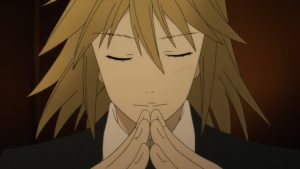 As to the flaws in the source material, they become more obvious as the series progresses. To wit, it’s endless adoration towards Kai. It gets a little tiresome in an of itself to see the protagonist treated so reverentially non-stop (including by the narrative) but it also kind of sucks the suspense out of the plot. What’s the point of showing us Shuuhei’s constant suffering to try to live up to Kai’s example when it’s so obvious he’ll never do it? The best he can hope for is to resign himself to the inevitable and contentedly live in Kai’s shadow – and that’s not much of a conclusion for the one major character in the story who actually has an arc.
As to the flaws in the source material, they become more obvious as the series progresses. To wit, it’s endless adoration towards Kai. It gets a little tiresome in an of itself to see the protagonist treated so reverentially non-stop (including by the narrative) but it also kind of sucks the suspense out of the plot. What’s the point of showing us Shuuhei’s constant suffering to try to live up to Kai’s example when it’s so obvious he’ll never do it? The best he can hope for is to resign himself to the inevitable and contentedly live in Kai’s shadow – and that’s not much of a conclusion for the one major character in the story who actually has an arc.
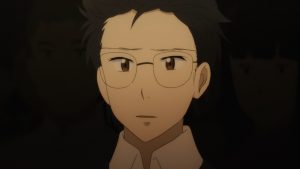 That said, there are certainly ample rewards to be had for sticking around. This is a series that shines best during the performances – not because of the way they’re drawn, but the way they sound. I’ve been critical of Gainax and Nakatani Gaku’s direction here, but the best decision they made was to have each of the characters performed by a different pianist. Not only does it make their sound very individualistic, but it allows the performers to show us evolution over time. Even if the animations of the performances aren’t especially expressive, the performances themselves are. And that makes up for a lot.
That said, there are certainly ample rewards to be had for sticking around. This is a series that shines best during the performances – not because of the way they’re drawn, but the way they sound. I’ve been critical of Gainax and Nakatani Gaku’s direction here, but the best decision they made was to have each of the characters performed by a different pianist. Not only does it make their sound very individualistic, but it allows the performers to show us evolution over time. Even if the animations of the performances aren’t especially expressive, the performances themselves are. And that makes up for a lot.
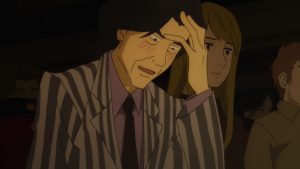 There’s also the matter of Chopin, and that’s a pretty great reward too. I adore Chopin of course, but I do get the idea of “Chopin fatigue” – and I thought Piano no Mori did quite a nice job of communicating how that could be a real issue for the judges. When you listen to Chopin in volume like this you realize that he was quite a flashy composer, actually – brash, even, and utterly confident in his ability to move an audience. And the pieces Kai chooses for his rotation (which takes up the entire episode, pretty much) and quite a flashy bunch. This is a confident program, make no mistake – it’s clear from the selections Kai makes and the order in which he plays them that he fully expects to blow the roof off the place.
There’s also the matter of Chopin, and that’s a pretty great reward too. I adore Chopin of course, but I do get the idea of “Chopin fatigue” – and I thought Piano no Mori did quite a nice job of communicating how that could be a real issue for the judges. When you listen to Chopin in volume like this you realize that he was quite a flashy composer, actually – brash, even, and utterly confident in his ability to move an audience. And the pieces Kai chooses for his rotation (which takes up the entire episode, pretty much) and quite a flashy bunch. This is a confident program, make no mistake – it’s clear from the selections Kai makes and the order in which he plays them that he fully expects to blow the roof off the place.
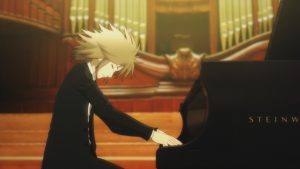 Personally, I thought things got a bit away from him at times – stuff like that fist at the end, really, is not the trademark of a real artist. But in the eyes of Piano no Mori and indeed most fiction that tackles this subject matter, that sort of musical braggadocio is always revered above restraint and respect. We’ve had this conversation before, but it’s a shame that in classical music drama the idea of being faithful to the spirit of the composer is treated almost like a character flaw. I almost feel as if I have to go listen to Radu Lupu doing some Mozart, just to cleanse myself – the piano equivalent of sitting under a waterfall.
Personally, I thought things got a bit away from him at times – stuff like that fist at the end, really, is not the trademark of a real artist. But in the eyes of Piano no Mori and indeed most fiction that tackles this subject matter, that sort of musical braggadocio is always revered above restraint and respect. We’ve had this conversation before, but it’s a shame that in classical music drama the idea of being faithful to the spirit of the composer is treated almost like a character flaw. I almost feel as if I have to go listen to Radu Lupu doing some Mozart, just to cleanse myself – the piano equivalent of sitting under a waterfall.
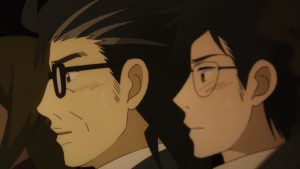 In any event, this is as good a stopping point as any for the series, given that we pretty much know how the rest of it is going to play out anyway. Piano no Mori will be returning in January, though whether that will be the final cour or not I don’t know. I sincerely hope it surprises me by surprising me, at least occasionally. But in any event it will be wonderful to immerse oneself in the world of classical piano again, an opportunity anime almost never affords us.
In any event, this is as good a stopping point as any for the series, given that we pretty much know how the rest of it is going to play out anyway. Piano no Mori will be returning in January, though whether that will be the final cour or not I don’t know. I sincerely hope it surprises me by surprising me, at least occasionally. But in any event it will be wonderful to immerse oneself in the world of classical piano again, an opportunity anime almost never affords us.


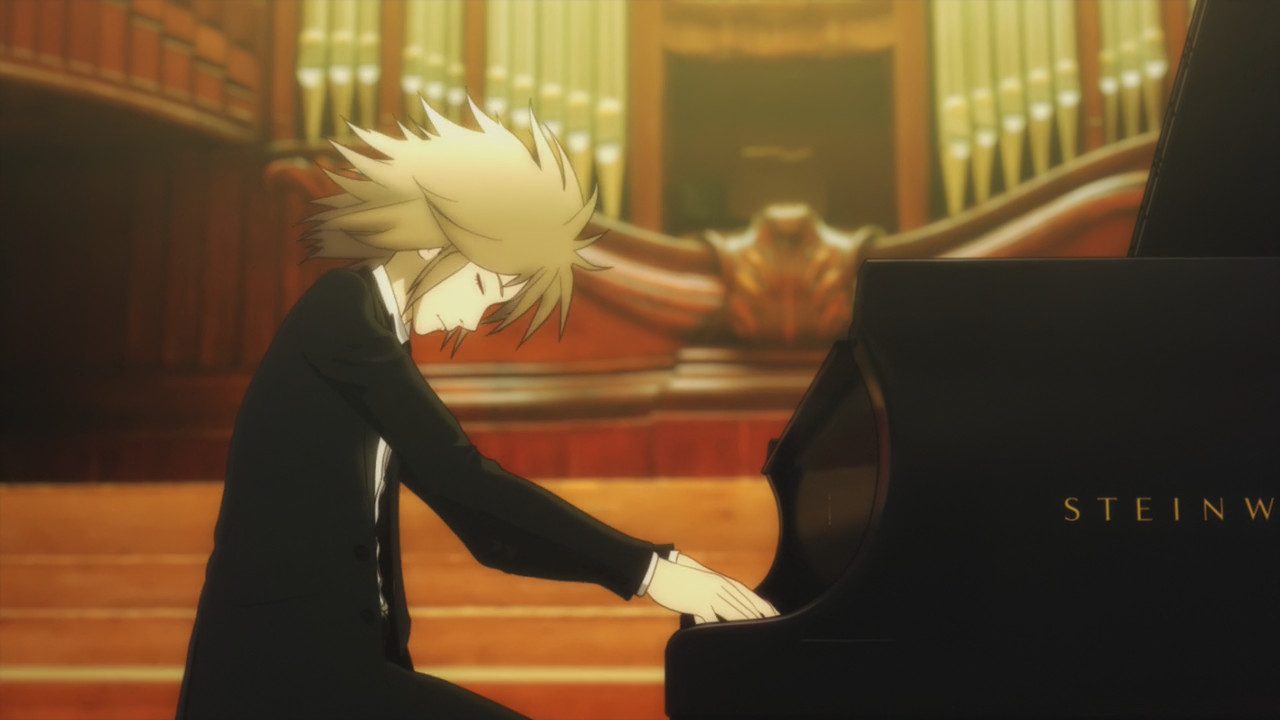
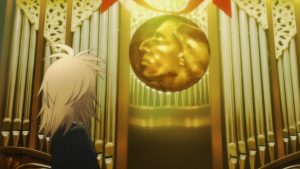
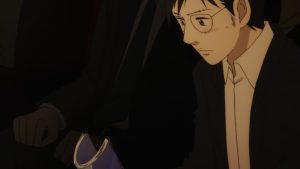
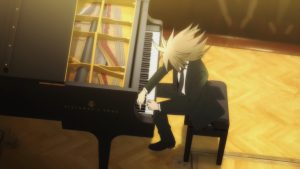
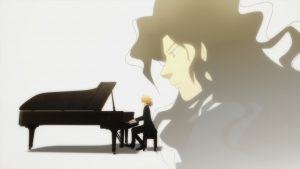
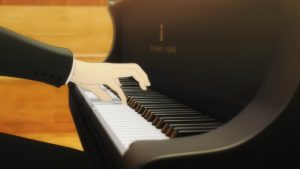
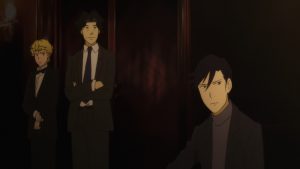

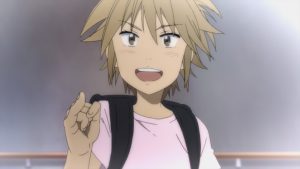
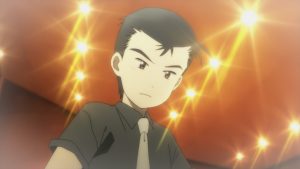
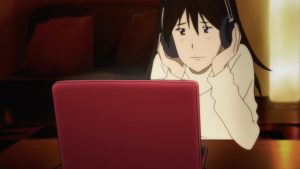
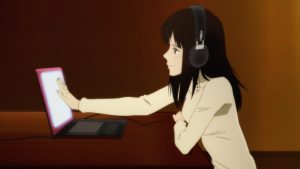
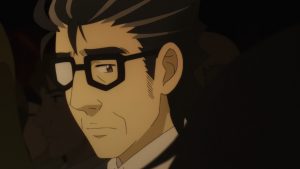
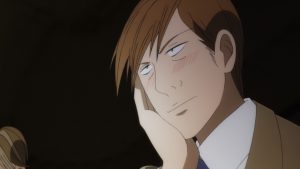

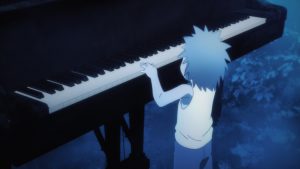
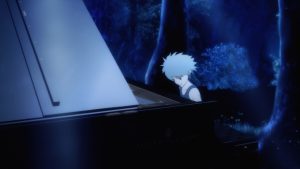
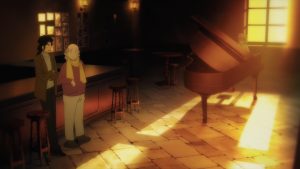
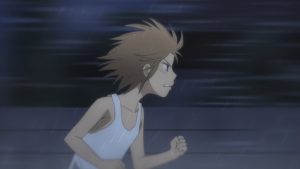
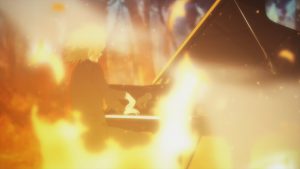
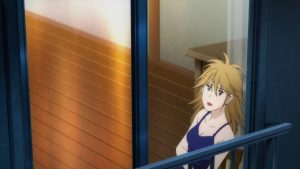
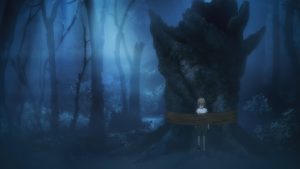
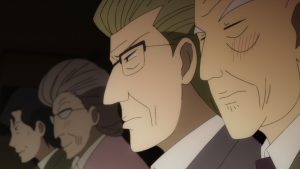
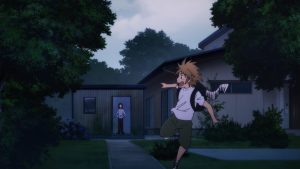
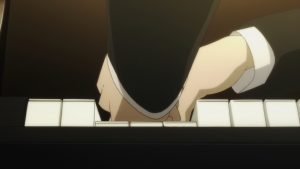
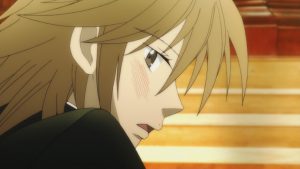
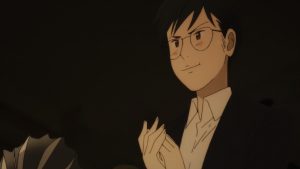
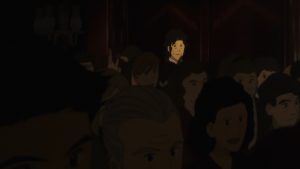


karma
July 9, 2018 at 6:13 am“It gets a little tiresome in an of itself to see the protagonist treated so reverentially non-stop (including by the narrative) but it also kind of sucks the suspense out of the plot. What’s the point of showing us Shuuhei’s constant suffering to try to live up to Kai’s example when it’s so obvious he’ll never do it?”
The more I read about Piano no Mori, the more I’m tempted to rewatch Glass Mask (2005 remake). There you also have naturally talented protagonist and hard working rival, but different starting points make their one upping more engrossing (besides method vs. classical acting is a thing, so approaches of both girls have merits).
Guardian Enzo
July 9, 2018 at 6:41 amI haven’t watched that one, actually. But I would point out that in classical piano both approaches have merits, too – it’s just that you’d never know that from the likes of Piano no Mori and (shudder) Shigatsu. Not that the problem is limited to anime and manga about classical music by any stretch of the imagination.
say
April 26, 2019 at 7:31 amI have only watched the first episode and wasn’t really charmed by it, plus I didn’t have much time for anime back then. Now that I have read some of your reviews about this series I am glad I gave up earlier. Our taste doesn’t always match but I can clearly envision what kind of show I should expect from your reviews so I can spare time. As for Glass Mask 2005 I would say it has many flaws concerning animation but if you can overcome them it is quite an enjoyable run, give it a try when your schedule isn’t busy. If we speak of depicting good rivalry I think it is a classic on the level of Touya-Shindou in HnG.
Guardian Enzo
April 26, 2019 at 7:33 amThat’s a pretty lofty comparison!
Glad I can be of some help, even if it’s deciding what not to watch, rofl.
Ngai-Han
July 9, 2018 at 3:40 pmAhh, I love seeing episode dedicated to musical performance. Ok, sp it didn’t have Hibike Euphonium levels of animation…however…The CG generated stuff is of course a cost cutting measure but it was very very carefully done this episode. Art style and aesthetics aside, that playing must have been taken from a real pianist, the movement is 95% spot on. All the undulating movements of the wrist and the awkward hand positions required of the OP track, the Op.10 no.1, were all there, reminding me all too well that I could never finish learning that piece, let alone master…
I wonder who performed Kai’s repetoire this episode? I was really very impressed!
Guardian Enzo
July 9, 2018 at 3:52 pmInteresting you mentioned that. I don’t think adult Kai’s performer has ever been revealed, has it?
I would agree, the CG did take a step up this time. Still not great, but you can tell they saved some budget up.
Collectr
July 9, 2018 at 4:35 pm“…it’s a shame that in classical music drama the idea of being faithful to the spirit of the composer is treated almost like a character flaw.” I’d have to disagree, at least for Nodame Cantabile. There, both Chiaki’s by-the-numbers approach and Nodame’s improvisational treatments are treated as flaws. Chiaki is dressed down for getting the notes but not the spirit, and Nodame for the reverse. Of course, Nodame Cantabile was a rom-com, not a drama.
Nodame Cantabile had terrible animation for most of the musical sequences too (still frames or awful CGI). It must go with the territory.
Guardian Enzo
July 9, 2018 at 5:34 pmI mostly agree about Nodame Cantabiile. To an extent at least, it’s an exception to that rule. But as far as anime and manga goes, it’s about the only one I can think of.
justfun
July 10, 2018 at 5:06 amI dropped the series after seven episodes. Although I don’t know the source material, I got the feeling it has a certain charm despite also being weak at times, but the anime was unable to get across these strong points. Storytelling was just too straightforward and too bland.
And while I love piano playing, surprisingly it didn’t touch me in the slightest here. Other series as Your Lie in April or Nodame are way better in making the music enjoyable and letting you feel the hard work behind it.